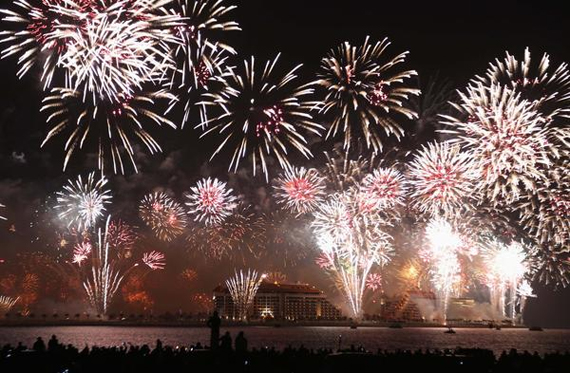
Dubai, Jan 14: Dubai fired 479,651 shells of fireworks on New Year’s eve, dazzling its way into the record books.
Not only did Dubai succeed in breaking the world record in the world’s “Largest Fireworks Display” category, the emirate also managed to smash it by firing roughly 80,000 shells per minute and 1,332 fireworks per second.
Revealing the details of the record, Guinness World Records said Dubai fired enough shells in the first 60 seconds to break the previous Guinness World Record, an hour-long show of 77,282 fireworks achieved in November 2011 by Kuwait.
As part of the rigorous verification process, Guinness World Records adjudicators physically counted all fireworks before and after the performance resulting in them confirming and verifying this extraordinary record-breaking achievement.
Thousands of people, who watched the spectacle from various locations, were left mesmerised by the dizzying array of colours.
Commenting on the new record, Talal Omar, Guinness World Record’s Adjudicator, stated: “This is an iconic record title that has been challenged and broken on a phenomenal scale by Dubai. I am pleased to confirm that Dubai has achieved a new Guinness World Record title for the Largest Fireworks Display.”
Spread across a shoreline of 95 kilometres, the fireworks were launched from stations mounted across all seven continents of the World Islands, its surrounding breakwater and across the entire Palm Jumeirah.
To ensure that the display was a triumph, a team made up of over 1,000 experts from the UAE and other countries were hired.
A further 200 pyro-technicians worked on the project and 100 computers installed to control the showdown to the millisecond. Accompanying the fireworks performance was music, specifically composed for the event and inspired by a local song.
Materials for the display were sourced locally and internationally. The display took ten months to plan and more than 5,000 man-hours to install.
The event, organised by Dubai, marked the end of an outstanding year for the city, which was awarded the World Expo 2020, and also celebrated the UAE’s 42nd National Day.





Comments
Well because as humans we have the natural ingrained
addiction to impulse buying. The rising popularity
of social media and social networking has created the necessity
to take the marketing funnel one level deeper and
create a category for your advocates. Affiliates can range from the average entrepreneur or individual who
personally recommends a product or service to their customers that they don't typically carry, all the way to multi national companies.
My blog post; yesil kahve cekirdegi hapi: http://www.feedbooks.com/user/1967342/profile
Add new comment